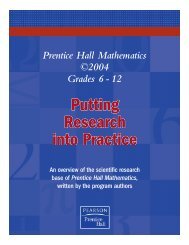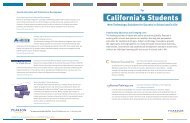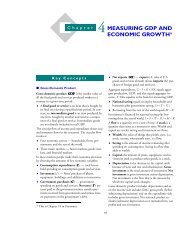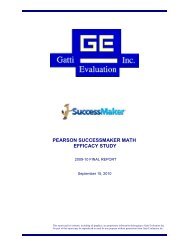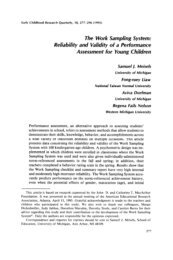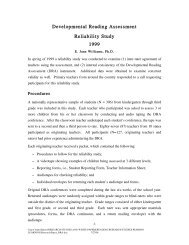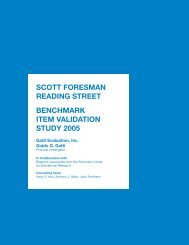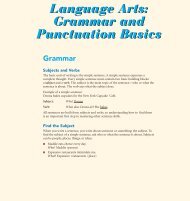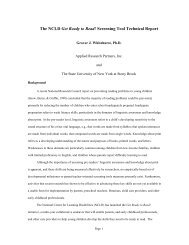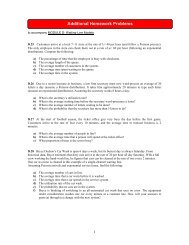Ellie - Pearson
Ellie - Pearson
Ellie - Pearson
- No tags were found...
You also want an ePaper? Increase the reach of your titles
YUMPU automatically turns print PDFs into web optimized ePapers that Google loves.
Case Study: ellie<strong>Ellie</strong>’s parents are concerned that her lack of focus,poor organization and time management skills, andongoing struggles with reading comprehensionand writing are contributing to declining motivationand increased frustration.Referral questionsinclude:1) Why has <strong>Ellie</strong> not shownadequate progress in responseto Tier 2 interventions?2) Does she have specificeducational needs that couldbe addressed to improve skillacquisition?3) Is she a student with a disabilitywho may require more intensiveintervention?2 ellieReason for Referral:<strong>Ellie</strong> is an 11-year-old (11:9) fifth grader referred in January for comprehensiveassessment by the campus Child Study Team because of failing gradesin her reading and language arts classes and near-failing grades in math.Her performance on the district benchmark tests fell within the at-risk levelon the fall assessment, and she has received Tier 2 interventions for the past10 weeks.Her parents are concerned that <strong>Ellie</strong>’s lack of focus, poor organization and timemanagement skills, and ongoing struggles with reading comprehension andwriting are contributing to declining motivation and increased frustration.She will take the state examination in the areas of reading, math, writing,and science later this year and her teachers are concerned that she willnot pass.
Background Information:Family history<strong>Ellie</strong> lives with her mother, stepfather, and two younger siblings, ages 2 and4. She has had no contact with her birth father since her mother remarried5 years ago. Mrs. Moore reports that her daughter met developmentalmilestones as expected and has no medical conditions. She indicates thereis no maternal family history of learning problems but that <strong>Ellie</strong>’s birth fathertook medication as a child for hyperactivity. The family moved seven timesbefore her fifth birthday and her mother indicates that <strong>Ellie</strong> had difficultyadjusting to each move. She has been enrolled in her current school sincekindergarten.According to her mother, <strong>Ellie</strong> gets along well with family members andthey frequently enjoy family activities such as riding bikes, camping, fishing,and boating. Mrs. Moore describes her daughter as friendly and well likedby others, but somewhat disorganized, forgetful, and often distracted,especially when doing her homework or chores at home.Academic history<strong>Ellie</strong>’s academic struggles began in second grade when she was retainedbecause her reading skills were below grade level. For the past 3 years, <strong>Ellie</strong>primarily has been a C-D student. Her lowest grades have been in readingand writing and her higher grades have been in math. Although her scoreswere low, she passed the state third-grade exam in all areas. This year, all ofher grades have dropped to the degree that her teacher may recommendretention.Intervention is notclosing <strong>Ellie</strong>’sachievement gapenough to put heron track to meetgrade-level goals.InterventionThis fall, <strong>Ellie</strong>’s fifth-grade teacher, Ms. Jones, contacted the campus ChildStudy Team with concerns about <strong>Ellie</strong>’s reading fluency and comprehension,writing, and math. The team placed <strong>Ellie</strong> in after-school tutoring twiceweekly for 30 minutes each session. According to her tutor, Mr. Clark, she wasassigned to a group with three other students and received interventionthat focused on learning effective comprehension strategies.Progress-monitoring data was collected using the AIMSweb® Reading-CBM(Oral Reading Fluency) prompts on a biweekly basis. During the 10 weeksof tutoring, <strong>Ellie</strong> has shown little progress. The other students in her tutorialgroup have gained an average of 3 wcpm per week whereas <strong>Ellie</strong> has gainedan average of .5 wcpm. Intervention is not closing her achievement gapenough to put her on track to meet grade-level goals.PsychCorp.com | 800.627.7271 3
Behavioral Observations:<strong>Ellie</strong> was observed during science when the class was working in smallgroups on a team project. The task requirement was to read a section in thetext, create a chart, and relate the information to a video shown the previousday. <strong>Ellie</strong> spent the assigned time talking with a friend in the group whileothers were reading. She did not participate in any of the assigned tasks.When asked by the observer about her role on the team, she commentedthat she didn’t like science and didn’t remember the video.During testing, <strong>Ellie</strong> demonstrated similar avoidance behaviors when askedto read or write. She would put her head on her arm on the table, sigh loudly,and make comments such as, “This is too hard. I can’t do it. I hate to read.” Sherequired considerable encouragement to complete the academic subtests.In spite of her frequent self-deprecating remarks when asked to do anythingthat required reading or writing, she was otherwise engaged in tasks withgood effort, attention, and persistence. She preferred tasks that were handsonand those in which she was asked to provide verbal responses to oralquestions. Her oral language skills, including vocabulary and syntax, appearto be age-appropriate.4 ellie
Assessment Plan:• Parent Interview (Mrs. Moore)• Teacher Interviews (fifth-grade teacher, Ms. Jones; tutor, Mr. Clark)• Student Interview• ACES (Academic Competence Evaluation Scales) (teacher, Ms. Jones)Select subtests from:• WISC ® -IV (Wechsler Intelligence Scale for Children ® ,Fourth Edition Integrated)• NEPSY ® -II (NEPSY ® , Second Edition)• DAS ® II (Differential Ability Scales, ® Second Edition)• WIAT ® -III (Wechsler Individual Achievement Test ® , Third Edition)• PAL -II Diagnostic Assessment for Reading and Writing(Process Assessment of the Learner, Second Edition)Test Results:Teacher InformationMs. Jones was asked to complete the ACES Teacher Rating form to clarifyher concerns related to <strong>Ellie</strong>’s academic abilities and academic-enablingskills and to prioritize her concerns based on which skills were critical forsuccess in her classroom. She noted significant concerns with <strong>Ellie</strong>’s readingand language arts skills and endorsed both as priorities for intervention.She identified academic strengths as <strong>Ellie</strong>’s oral communication, problemsolving,and generalization skills. She also identified significant academicenablerconcerns related to motivation and study skills, and she markedmotivation as her highest priority. She endorsed <strong>Ellie</strong>’s strength as herinterpersonal skills.Student Information<strong>Ellie</strong> describes herself as “a bad student who needs to work harder.” She saysthat she likes math but that the class is much harder this year. She commentsthat she wishes her teachers would not require so much writing and thatsometimes she knows the answer but has difficulty putting words downon paper. When asked about her strengths, <strong>Ellie</strong> commented that she is agood artist.PsychCorp.com | 800.627.7271 5
AchievementIn order to establish <strong>Ellie</strong>’s skill levels in the academic areas of concern,she was administered the WIAT ® -III subtests for reading, writing, andmathematics. Her achievement is reported by comparing her performanceto those of students in fifth grade, mid-year.Reading Skills<strong>Ellie</strong> was asked to read whole words (Word Reading subtest); her score of78 fell below average at the 7th percentile ranking. Her ability to decodenonsense words (Pseudoword Decoding subtest) also fell below average,with a standard score of 75 placing her at the 5th percentile ranking.When asked to read or write,<strong>Ellie</strong> would put her head onher arm on the table, sighloudly, and make commentssuch as,“This is too hard.I can’t do it.I hate to read.”An item-level error analysis reveals that she missed words containingirregular vowels, vowel digraphs, consonant digraphs, or silent consonants.Further, <strong>Ellie</strong> does not read real or nonsense words with automaticity. Shereads whole words much more slowly than her grade peers do; in fact, itfrequently took her up to 5 seconds to recognize words that she knew. Whenshe began to miss words, she quickly lost confidence and began to guess.<strong>Ellie</strong> also was asked to read aloud from a passage that was at fifth-gradereading level. Her reading was so slow and laborious that she was asked toread at the fourth-grade level instead. This level was also too difficult, so heroral reading fluency score is based on reading at the third-grade level. All of<strong>Ellie</strong>’s oral reading scores fell in the below-average range. Her Oral ReadingFluency standard score of 69 fell at the 2 nd percentile ranking, her OralReading Accuracy yielded a standard score of 75 (5 th percentile ranking),and her Oral Reading Rate standard score was 71 (3 rd percentile ranking).She reads without prosody, which further affects her poor fluency.Next, <strong>Ellie</strong> was asked to read grade-level passages (she chose to read silently)and to answer questions orally about what she had read. When providedtext at the fifth-grade level, she could not answer the requisite number ofaccompanying questions. After working backwards grade by grade, theexaminer deemed that the most appropriate level for evaluating <strong>Ellie</strong>’sreading comprehension was the third-grade level. Her comprehensionscore at this level was a 79 (8 th percentile ranking).She demonstrates very poor comprehension even on reading materials thatare two grade levels below her grade placement. These scores are consistentwith her abilities in word reading and oral reading and they help explainwhy she is having so much difficulty when expected to read and understandfifth-grade texts. Given that students are asked infrequently to read aloud6 ellie
after the primary grades, it is certainly possible that her teachers are unawareof just how poor her basic reading skills are. It is also not surprising that sheavoids reading whenever possible.Written Expression<strong>Ellie</strong>’s scores on the Written Expression subtests also fall within the belowaveragerange. Her Spelling standard score is 75 (5 th percentile ranking)since she demonstrates encoding errors similar to her decoding errors inreading. She was generally able to represent initial sounds correctly butmade numerous errors in producing correct vowel and consonant digraphs.Her typical approach was phonetic but some spellings were unrecognizableand she misspelled every irregular word administered.When asked to combine multiple sentences or generate a sentence usinga target word, she earned a Sentence Composition standard score of 80 (9 thpercentile ranking). Her score on Sentence Combining was slightly strongerthan on Sentence Building and her errors were primarily with writingmechanics (spelling and punctuation).She also experienced difficulty on a task that required her to write anessay in response to a prompt. Her Essay Composition score of 78 (7 thpercentile ranking) was the result of errors in writing mechanics, poortheme development, and poor text organization. She waited for almost a fullminute before beginning to write and wrote fewer words than the typicalfifth grader.WIAT-III subtest resultsshow that <strong>Ellie</strong>’sachievement scoresare consistent with herclassroom performanceand reveal significantdeficits in bothreading and writing.MathematicsAt the same time, <strong>Ellie</strong>’s average score of 98 (45 th percentile ranking) on theWIAT-III Numerical Operations subtest identifies an academic strength, buther Math Problem Solving standard score is 85 (16 th percentile ranking).It appears that her reading difficulties influence her ability to solve wordproblems in spite of the fact that the items were read to her and remainedin view as she attempted each item. On occasion, <strong>Ellie</strong> had difficulty settingup the problem and erased and reworked. Once she began calculation, shegenerally gave the correct answer.Achievement Scores SummaryOverall, <strong>Ellie</strong>’s achievement scores indicate below- average performance inbasic reading, reading fluency, reading comprehension, spelling, and writtenexpression. Conversely, her math calculation and math problem-solvingscores are within the average range. Her achievement scores are consistentPsychCorp.com | 800.627.7271 7
with her classroom performance and reveal significant deficits in bothreading and writing. The next step was to determine whether <strong>Ellie</strong> has thecognitive abilities necessary to support the acquisition of academic skills.Cognitive ProcessesIn order to evaluate <strong>Ellie</strong>’s cognitive processes, the 10 WISC ® -IV core subtestswere administered, followed by three of the WISC-IV Integrated subtests. Inaddition, five NEPSY ® -II subtests were administered and one DAS ® II subtestwas given.The discrepancybetween <strong>Ellie</strong>’s verbalreasoning abilitiesand her academicdeficits no doubtcontributes to herfrustration, particularlywhen asked todemonstrate whatshe has learnedthrough writing.<strong>Ellie</strong>’s FSIQ score of 100 on the WISC-IV test is attenuated by two index scoresthat are significantly lower (at the .05 level) than the other index scores. As aresult of these unusual discrepancies (less than 10% base rate), the GeneralAbility Index (GAI), which is an alternative global score, was determined tobe a better representation of <strong>Ellie</strong>’s overall cognitive ability. Her GAI score of111 (77 th percentile ranking) places her in the high average range.Verbal Reasoning<strong>Ellie</strong>’s Verbal Comprehension Index (VCI) score, based on subtests thatmeasure verbal reasoning and concept formation, is 110 (75 th percentileranking). She demonstrates relative cognitive strengths in the areas oflanguage development, verbal abstract reasoning, word knowledge, andverbal concept formation. VCI correlates highly and is a good predictor of astudent’s achievement, particularly in the areas of reading and writing.Her high average VCI score would predict at least average achievementbut that is not the case, so that her underachievement in these two areasis unexpected. This discrepancy between her verbal reasoning abilities andher academic deficits no doubt contributes to her frustration, particularlywhen asked to demonstrate what she has learned through writing. It islikely that her poor reading comprehension is not due to weak vocabularyor other language-related skills.Nonverbal, Visual-Perceptual Reasoning<strong>Ellie</strong>’s Perceptual Reasoning Index (PRI), based on measures of nonverbalabstract reasoning, visual perception, and organization, is 108 (70 th percentileranking). Her verbal and nonverbal abilities are commensurate but it shouldbe noted that her score on Block Design was lowered by slower speed (asseen in the BDN score of 11 versus her BD score of 9). On the two PRI subteststhat did not require quick response time, her high average scores are amongher highest.8 ellie
She also was given Elithorn Mazes, on which she performed at the 16 thpercentile ranking. This timed subtest required her to draw a trail through amaze while observing specific rules. The task taps some of the same abilitiesas the other PRI subtests (i.e., visual scanning, visual and motor sequentialprocessing, cognitive flexibility, planning and organization) but also requiresthe ability to inhibit a response until a route can be identified. <strong>Ellie</strong> did notrespond impulsively and it is likely that her lower score is the result of acombination of slower cognitive-processing speed and weak visual-spatialmental manipulation (working memory).Working Memory<strong>Ellie</strong>’s Working Memory Index (WMI), based on subtests requiringauditory attention, concentration, and sequencing skills as well as mentalmanipulation of verbal information held in short-term memory, is 88 (21 stpercentile ranking). <strong>Ellie</strong> was administered the Digit Span (forward andbackward), Visual Span, and Spatial Span subtests. She is able to registerverbal information in short-term memory (Digit Span Forward=SS 9) aswell as other children her age can, but when she must manipulate thatinformation over a brief time period, her score drops to below average (DigitSpan Backward=SS 6). Her ability to register information that is presentedvisually is weaker than her ability to register information that is conveyedverbally (Visual Digit Span=SS 6). She has similar difficulty when informationmust be registered in a visual-spatial format (Spatial Span Forward=SS 6)but mental manipulation of visual-spatial information was her weakestscore (Spatial Span Backward=SS 5), placing her at the 5 th percentile ranking.Her behavior on these tasks was familiar in that she attempted to holdinformation in short-term memory using her stronger verbal ability. Sheverbally rehearsed the information for both Digit Span and Visual Spanbut was unable to use that strategy effectively on Spatial Span. She closedher eyes on the later subtest, shook her head, frowned, and expressed herfrustration. Her responses appeared to be guesses although she was able tomatch the number of items that had been presented. She requested a breakafter these subtests, commenting that she had a headache.<strong>Ellie</strong> demonstrates manybehaviors typicallyseen in youngsters withexecutive dysfunction;namely, poor abilities inplanning, organization,and sustained attentionas well as lack ofeffective and efficientlearning strategies(metacognition).Processing Speed<strong>Ellie</strong> earned her lowest scores on the two subtests that contribute to theProcessing Speed Index (PSI), which is 83 (13 th percentile ranking). Herperformance on Coding, which requires processing speed, short-termmemory, learning ability, cognitive flexibility, attention, and motivation,PsychCorp.com | 800.627.7271 9
NEPSY-II subtestresults suggest thatverbal reasoning is astrength for <strong>Ellie</strong> butthat she is easilyoverwhelmed by toomuch incoming andcompeting verbalinformation, she doesnot benefit significantlyfrom repetition, andlearning improves whenshe has additional timeto consolidate newinformation intolong-term memory.placed her at the 16 th percentile ranking. <strong>Ellie</strong> showed considerablefrustration on this task, talking her way from one symbol to the next. Witheach new numeral, she returned to the key for the corresponding symbol,suggesting that her rate was slowed by difficulty either in getting the newinformation into short-term memory or in benefitting from the repetition sothat she actually “learned” the pairings.Her slower speed on Symbol Search (also at the 16 th percentile ranking) wasalso the result of checking the targets repeatedly. Both PSI subtests requirethe quick identification and discrimination of visual-symbolic information, anecessary ability for accurate, fluid reading.Memory and LearningIn order to investigate how <strong>Ellie</strong>’s slower processing speed and difficulties onworking-memory tasks affect learning, she was given select subtests fromthe NEPSY ® -II and DAS ® II tests.NEPSY-II List Memory subtest resultsWhen given a task of learning a list of 15 words after hearing the list 5 times(NEPSY-II List Memory), <strong>Ellie</strong> was able to improve her performance froman initial recall of 6 words to 9 words whereas other children her age inthe normative sample who had similar initial recall improved with verbalrepetition to 12 words. Then, she was presented an alternative list and sherecalled 5 of the 15 new words, which resulted in an average score similar toher initial performance on the first list.Next, <strong>Ellie</strong> was asked to repeat the initial list without benefit of a newpresentation and her recall dropped to 6 words. The recall of the first listwas affected by the interference caused by the alternative list. Meanwhile,age mates in the normative sample who had similar initial recall on thealternative list were able to recall 11 words from the original list. After a timedelay of 25 minutes and without any prior warning, <strong>Ellie</strong> was asked oncemore to recall the initial list. Her recall was not affected by the time delay; infact, the additional time had a positive effect on her performance.In summary, it appears that <strong>Ellie</strong> is easily overwhelmed by too much incomingand competing verbal information, she does not benefit significantlyfrom repetition, and learning improves when she has additional time toconsolidate new information into long-term memory. Even though verbalreasoning is a strength, <strong>Ellie</strong> struggles with verbal tasks that require herto learn lots of information quickly. It also should be noted that her verbalrehearsal strategy might actually contribute to additional interference.10 ellie
Summary: ellieIn spite of high average cognitive abilities, <strong>Ellie</strong> has experienced academicdifficulties in reading and writing since second grade. Intervention hastypically been provided through re-teaching (tutorials and grade retention)although, this year, her intervention has focused on reading-comprehensionstrategies. These approaches have been minimally effective and thisevaluation sheds some light on why she is a nonresponder.Referral question #1: Why has <strong>Ellie</strong> not shown adequateprogress in response to Tier 2 interventions?Over time, considerable effort has been put forth to improve <strong>Ellie</strong>’sphonological skills. Unfortunately, her reading deficits are not justphonological; rather, she is also delayed in her development of the necessaryorthographic skills, which also require remediation. Repetition has not beenparticularly helpful because this is not the best way for her to learn newinformation. Further, her deficits in working memory have interfered withthe transfer of new learning into long-term memory. Teaching readingcomprehension strategies using grade-level text has not been effectivebecause she cannot read enough of the words to capture meaning.Referral question #2: Does she have specific educationalneeds that could be addressed to improve skill intervention?The second referral question deals with how <strong>Ellie</strong> learns and how instructionmight be altered to increase skill acquisition. <strong>Ellie</strong> tends to learn moreeffectively when instruction is provided orally. In fact, she adds her ownverbal input when presented with new information. However, her verballearning is susceptible to interference, so it is easy for her to lose newinformation or confuse it with other pieces of information early in thelearning process. Her overall processing speed is slow and she has a limitedrepertoire of learning strategies. Her verbal rehearsal requires more timeand can actually create interference.PsychCorp.com | 800.627.7271 13
However, it appears that the effects of interference may be more temporarythan permanent and some learning occurs in spite of it. <strong>Ellie</strong> is easilyoverwhelmed by too much incoming data or the need to integratemultisensory information quickly. Because new learning requires additionaltime to be consolidated into long-term memory, she usually has learnedmore information than she is able to demonstrate immediately. In otherwords, providing additional time and limiting the amount of informationto be learned is more beneficial than repetition. Presenting her with limitedamounts of information at regular successive intervals may increase herlearning.Another important factor is related to executive functions. She does notorganize incoming information in a way that would enhance later recall. Sheis somewhat impulsive and does not plan how to accomplish a task. <strong>Ellie</strong>also exhibits deficits related to cognitive flexibility. She tends to get stuckon a solution and cannot generate alternatives. She is not strategic whenproblem solving, so she is quickly frustrated when her initial solution is notviable. When frustration sets in, effort declines.Teaching <strong>Ellie</strong> how to use visual imagery and visual organizational strategiesto better encode new information can place fewer demands on her verbalworking-memory system. Providing opportunities to brainstorm alternativeideas can support more flexible and productive problem solving. These twostrategies can be especially helpful when she needs to demonstrate herknowledge through writing.14 ellie
Referral question #3: Is she a student with a disability whomay require more intensive intervention?In spite of <strong>Ellie</strong>’s strong reasoning abilities, her cognitive deficits related toslower processing speed, working memory, and executive functions haveaffected the acquisition of reading and writing skills. She has significantdeficits in both the phonological and the orthographic skills necessary forreading, so she struggles to decode words, identify nondecodable words,and automatically recognize whole words. As a result, she lacks fluency. Allof these deficits contribute to her inability to read text with understanding(comprehension). Her inability to encode words is evident in her poorspelling performance. Her difficulty in applying writing mechanics hasresulted in written expression skills that are significantly below grade-levelexpectations.The results of this evaluation provide a body of compelling evidence that<strong>Ellie</strong> is a student with a Specific Learning Disability in the areas of basicreading, reading fluency, reading comprehension, and written expression.Additionally, results related to her executive dysfunction suggest probableAttention Deficit Disorder, Predominantly Inattentive Type.To foster better reading and writing outcomes, <strong>Ellie</strong> needs remediation ofher basic phonological and orthographic skills through systematic, explicit,and direct instruction. Progress monitoring should continue on a biweeklybasis. She can also benefit from frequent opportunities to read orallyfrom text written at third- to fourth-grade level to increase comprehensionand fluency.Reading-comprehension strategies should be taught using text that isat her independent reading level. Teachers can provide additional timefor her to answer questions orally and to complete class assignmentsrelated to new learning. Check for understanding after she has had time toconsolidate the new learning into long-term memory. Help her learn howto plan and organize her time to increase efficiency on long-term tasks.Teach her memory strategies, including ways to organize information, tobuild memory span, to add visual imagery, and to determine when verbalrehearsal is beneficial and when a different approach is required.The information from this evaluation will be presented to <strong>Ellie</strong>’s parents andIEP committee for purposes of eligibility determination and creation of anappropriate intervention plan.PsychCorp.com | 800.627.7271 15
ReferencesBerninger, V.W. (1998). Process assessment of thelearner (PAL): Guides for intervention—Readingand writing. San Antonio, TX: The PsychologicalCorporation.Feifer, S.G. & DeFina, P.A. (2000). The neuropsychologyof reading disorders: Diagnosis and interventionworkbook. Middleton, MD: School Neuropsych Press.National Reading Panel. (2000). Teaching children toread: An evidence-based assessment of the scientificliterature on reading and its applications for readinginstruction. Washington, DC: National Institute ofChild Health and Human Development (NICHD).Weiss, L.G., Saklofske, D.H., Prifitera, A., & Holdnack,J.A. WISC-IV advanced clinical interpretation. (2006).Boston, MA: Academic Press.800.627.7271 | PsychCorp.comCopyright © 2010 <strong>Pearson</strong> Education, Inc. or its affiliate(s). All rights reserved. DAS, PAL, <strong>Pearson</strong> and PsychCorp are trademarks and AIMSWEB, NEPSY, WIAT, WISC, and the Design for Psi is a registered trademark, in the U.S. and/or other countries, of <strong>Pearson</strong> Education, Inc. or its affiliate(s). 4580 07/10 F9102CS



